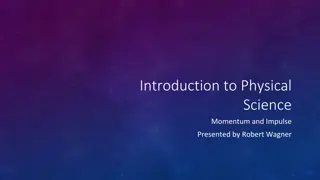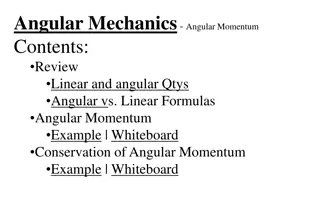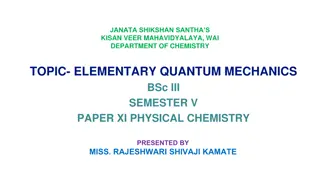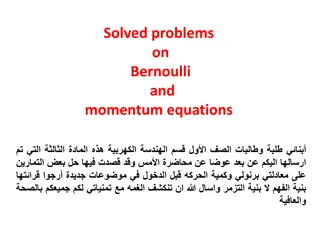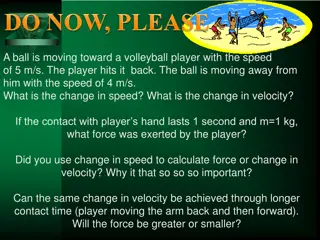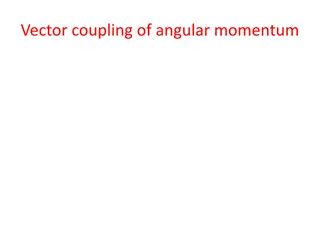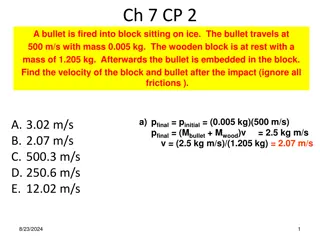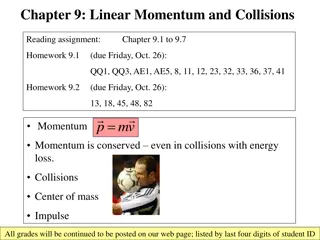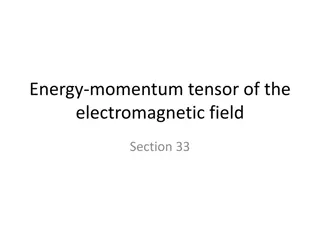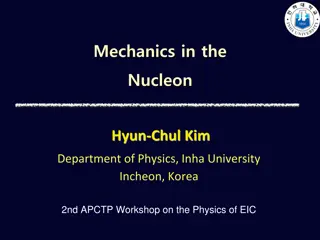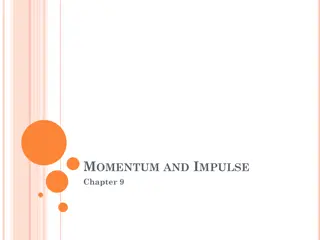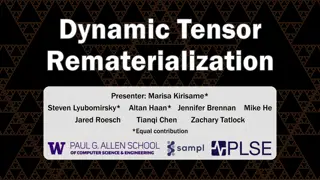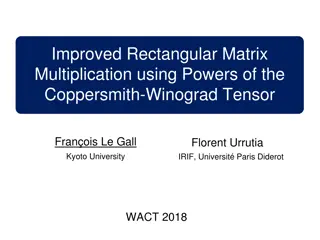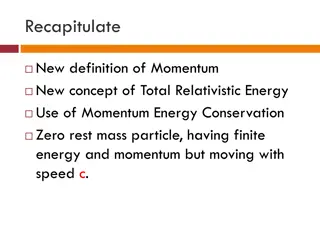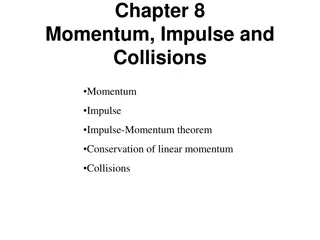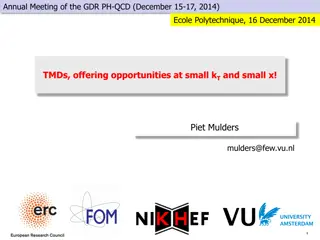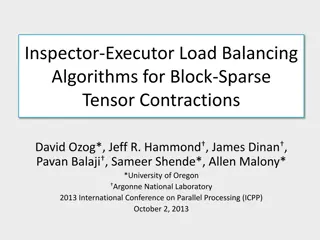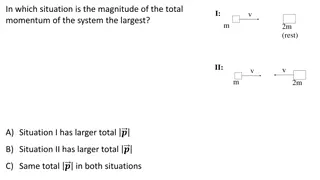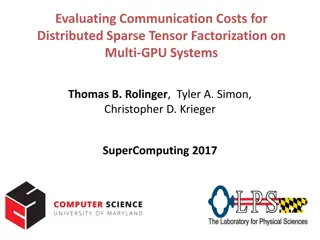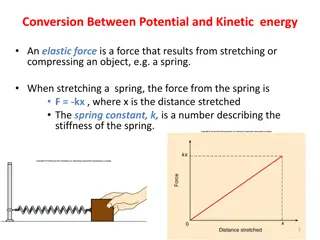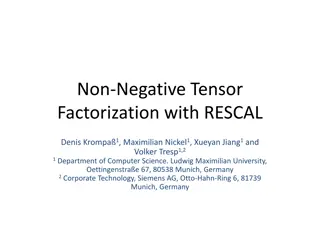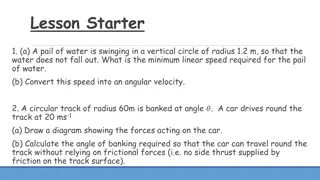Green Energy Market
Green energy also referred to as clean energy, is usually derived from natural sources that are constantly replenished. Solar energy, wind energy, hydroelectric power, biomass energy, geothermal energy, tidal energy, and wave energy are different types of renewable energy. Solar energy is the radian
6 views • 6 slides
Understanding Momentum and Impulse in Physical Science
Momentum and impulse play crucial roles in physical science, with momentum defined as mass multiplied by velocity and impulse as the change in momentum. This concept is explored through examples and discussions on Newton's Second Law and practical applications in everyday life, such as airbags in ca
3 views • 8 slides
Understanding Angular Momentum in Mechanics
Explore the key concepts of angular momentum in mechanics, including the difference between linear and angular quantities, angular momentum calculations, conservation principles, and practical examples illustrated on whiteboards. Delve into formulas, equations, and scenarios to grasp the fundamental
4 views • 27 slides
Angular Mechanics - Angular Momentum Concepts and Examples
Understanding angular momentum in mechanics involves reviewing linear and angular quantities, comparing angular to linear formulas, and exploring examples of angular momentum and conservation principles. The content covers key factors like angular quantities, torque, and moment of inertia, along wit
3 views • 23 slides
Heisenberg's Uncertainty Principle in Elementary Quantum Mechanics
Heisenberg's Uncertainty Principle, proposed by German scientist Werner Heisenberg in 1927, states the impossibility of simultaneously and accurately determining the position and momentum of microscopic particles like electrons. This principle challenges classical concepts of definite position and m
0 views • 49 slides
Fluid Mechanics Problem Solving with Bernoulli and Momentum Equations
Explore solved problems related to Bernoulli and momentum equations in fluid mechanics, including calculations of discharge, velocity, flow types, pressure losses, and energy lines. Dive into scenarios involving conduit profiles, pipeline configurations, and Reynolds number calculations for water an
0 views • 21 slides
Understanding Momentum and Impulse in Sports
Momentum and impulse play a crucial role in sports performance. In a volleyball scenario where a ball is hit back by a player, understanding the change in speed, velocity, and force exerted can enhance gameplay strategies. Momentum is a key physics concept that affects an object's motion and the for
0 views • 40 slides
Understanding Angular Momentum in Quantum Mechanics
Exploring the concept of total angular momentum in quantum mechanics, which involves the quantization of orbital and spin angular momenta. The coupling of these vectors leads to the formation of total angular momentum, with implications for the behavior of single-electron systems like the hydrogen a
0 views • 16 slides
Understanding Energy Transformation in the Natural World
Energy transformation occurs continuously in various forms around us, following the Law of Conservation of Energy. From thermal to chemical and electromagnetic energy, different types of energy are converted and utilized in everyday processes. Examples include the conversion of thermal energy to ele
0 views • 27 slides
Understanding Momentum and Newton's Laws in Physics
Momentum is the product of mass and velocity, influencing an object's resistance to changes in motion. Newton's second law relates force to acceleration, while impulse is crucial in altering an object's momentum. Explore examples illustrating these concepts in action.
1 views • 9 slides
Understanding Momentum in Physics
Explore the concept of momentum in physics through scenarios involving collisions and rotational displacement. Learn how momentum is conserved in different situations and its impact on the final direction of motion. Discover the relationship between velocities, masses, and changes in momentum in var
0 views • 31 slides
Understanding Impulse and Momentum in Physics
Impulse, defined as the force times the time over which it acts, is crucial in changing an object's momentum. Various scenarios such as golf impact, billiard ball collisions, and skateboard acceleration are explored to demonstrate the importance of force, time, and impulse in physics concepts. Learn
14 views • 9 slides
Physics Applications: Momentum, Impulse, and Recoil Calculations
Explore various physics scenarios involving momentum, impulse, and recoil in this collection. Calculate the impulse of net force, average net force, recoil velocity of a rifle, and initial speed of a bullet using principles of conservation of momentum. Solve problems related to multi-dimensional imp
0 views • 5 slides
Understanding Linear Momentum and Collisions in Physics
Exploring the concepts of linear momentum, collisions, and conservation of energy in physics, this content covers topics such as momentum definition, conservation laws, impulse, types of collisions, and examples of perfectly inelastic and elastic collisions. It also includes a practical blackboard e
0 views • 17 slides
Understanding the Energy-Momentum Tensor of the Electromagnetic Field
Exploring the intricacies of the energy-momentum tensor of the electromagnetic field, including its components, symmetries, and implications on field interactions and invariants. Delve into the mathematical derivations and transformations involved in studying this fundamental concept in electromagne
0 views • 19 slides
Understanding Nucleon Structure: Insights from EIC Workshop
Exploring the mechanics of nucleons and the physics goals of the Electron-Ion Collider (EIC), this content delves into the origin of nucleon mass and spin, emergent properties of dense gluon systems, and energy-momentum tensor in QCD. It discusses the role of gluons in understanding nucleon structur
0 views • 31 slides
Understanding Momentum and Collisions in Physics
Momentum plays a crucial role in analyzing collisions, where objects exert forces on each other over short time intervals. Conservation of momentum, following Newton's laws, allows predicting outcomes in collisions by redistributing momentum among objects. The concept is illustrated through examples
0 views • 25 slides
Understanding Conservation of Momentum in Physics
Conservation of momentum in physics addresses how the total momentum of a system remains constant in a collision or interaction between objects. Newton's Third Law and the law of conservation of momentum play key roles in explaining the transfer of momentum between objects during collisions. Momentu
0 views • 11 slides
Understanding Momentum and Impulse in Physics
Explore the concepts of momentum and impulse in physics, including the definition of momentum, the impulse-momentum theorem, and how factors affect object motion post-collision. Discover how momentum plays a vital role in describing an object's motion and learn about the relationship between force,
0 views • 30 slides
Overcoming Memory Constraints in Deep Neural Network Design
Limited availability of high bandwidth on-device memory presents a challenge in exploring new architectures for deep neural networks. Memory constraints have been identified as a bottleneck in state-of-the-art models. Various strategies such as Tensor Rematerialization, Bottleneck Activations, and G
0 views • 32 slides
Understanding the Acceleration of the Universe and the Equivalence Principle Violation in the Horndeski Vector-Tensor Theory
Exploring the implications of the Equivalence Principle Violation after reheating in the context of the accelerated expansion of the universe. The study delves into the Horndeski vector-tensor theory, gravitational waves, and the impact of modified gravity and dark energy. Insights are provided on t
2 views • 20 slides
Understanding the Hall Effect in Conductors
The Hall Effect in conductors is described in detail, showcasing how a magnetic field affects the conductivity tensor, breaking symmetry and leading to unique properties. The discussion covers the separation of the conductivity tensor, the impact of magnetic fields on conductivity components, and th
1 views • 16 slides
Improved Rectangular Matrix Multiplication Using Coppersmith-Winograd Tensor
In this research, the complexity of rectangular matrix multiplication is enhanced by analyzing the fourth power of the Coppersmith-Winograd tensor. By extending the understanding of the tensor's power, significant advancements have been made in the efficiency of non-square matrix multiplication, sur
0 views • 25 slides
Understanding Relativistic Energy and Momentum in Particle Physics
Discuss the new definition of momentum and the concept of total relativistic energy. Explore the use of momentum-energy conservation in scenarios involving zero rest mass particles. An example of an inelastic collision is provided to demonstrate the application of these principles.
0 views • 51 slides
Understanding Momentum, Impulse, and Collisions in Physics
Learn about momentum, impulse, and collisions in Chapter 8 of physics. Understand how linear momentum, impulse, and the Impulse-Momentum theorem are crucial in analyzing collisions and conservation of momentum. Explore real-world applications in sports and scenarios like a child driving a bumper car
0 views • 19 slides
Understanding Nucleon Spin Decomposition and Proton Spin Problem
Explore the complex realm of nucleon spin decomposition and the enigmatic proton spin problem, delving into concepts like orbital angular momentum, quarks and gluons' helicity, and longitudinal double spin asymmetry in polarized deep inelastic scattering. Learn about the spin crisis, gluon polarizat
0 views • 26 slides
Exploring Transverse Momentum Distributions (TMDs) at the GDR PH-QCD Annual Meeting
The Annual Meeting of the GDR PH-QCD focused on discussing Transverse Momentum Distributions (TMDs) and their significance at small kT and small x values. Topics covered include gauge-invariant correlators, PDFs, and PFFs, as well as the utilization of color gauge links in describing partonic transv
0 views • 33 slides
Understanding Different Forms of Energy and Work in Physics
Energy in physics is the capacity to do work, and there are various forms of energy such as radiant energy, kinetic energy, gravitational potential energy, elastic potential energy, chemical potential energy, nuclear potential energy, electrical potential energy, thermal energy, and sound energy. Ea
0 views • 47 slides
Dynamic Load Balancing in Block-Sparse Tensor Contractions
This paper discusses load balancing algorithms for block-sparse tensor contractions, focusing on dynamic load balancing challenges and implementation strategies. It explores the use of Global Arrays (GA), performance experiments, Inspector/Executor design, and dynamic buckets implementation to optim
1 views • 32 slides
Understanding Energy Service Companies (ESCOs) and Their Role in Energy Efficiency
Energy Service Companies (ESCOs) like Lamit offer a range of energy services, from implementing energy-efficiency projects to renewable energy solutions. These companies work as long-term energy management partners, focusing on understanding customer needs, providing energy-saving solutions, and gua
2 views • 18 slides
Momentum and Collisions Explained Through Illustrations
Explore various scenarios involving momentum, collisions, and elastic interactions through illustrated examples. Understand concepts such as total momentum in different situations, speeds of masses after collisions, momentum conservation in 1-D and 2-D collisions, and changes in momentum direction.
0 views • 28 slides
Communication Costs in Distributed Sparse Tensor Factorization on Multi-GPU Systems
This research paper presented an evaluation of communication costs for distributed sparse tensor factorization on multi-GPU systems. It discussed the background of tensors, tensor factorization methods like CP-ALS, and communication requirements in RefacTo. The motivation highlighted the dominance o
0 views • 34 slides
Conservation of Momentum in Collisions: University of Ottawa Physics Lab
Study the conservation of linear momentum and energy in elastic and inelastic collisions in one dimension at the University of Ottawa's physics lab. Analyze the motion of gliders on an air track, observe changes in velocity, momentum, and energy, and compare position-time and velocity vs. time graph
0 views • 15 slides
Understanding Energy Conversion, Power, and Momentum in Physics
Exploring the concepts of energy conversion between potential and kinetic energy, the importance of power in work efficiency, and the role of momentum and impulse in describing motion in physics. The discussion covers elastic forces, work done, power calculations, examples of watt and joules, as wel
0 views • 28 slides
Non-Negative Tensor Factorization with RESCAL
This article discusses non-negative tensor factorization with RESCAL, covering topics such as Non-Negative Matrix Factorization, Multiplicative Updates, RESCAL for Relational Learning, and Non-Negative Constraint for RESCAL. It explores how factorizing matrices/tensors into non-negative factors can
0 views • 11 slides
Understanding Momentum and Impulse in Physics
Momentum is the product of an object's mass and velocity, while impulse is the change in momentum resulting from a force acting over time. By applying force for a longer duration, momentum can be increased or decreased effectively. The relationship between impulse and momentum is crucial in understa
0 views • 26 slides
Understanding Momentum and Impulse in Physics
Momentum, defined as mass x velocity, and impulse, the change in momentum resulting from a force over time, are essential concepts in physics. This chapter explores how momentum can be altered through changes in mass or velocity and how impulse affects momentum. The relationship between force, time,
0 views • 27 slides
Understanding Angular Momentum in Physics
Learn about the concept of angular momentum in physics through practical examples and explanations. Explore how angular momentum is conserved in rotating bodies and how it impacts various sports activities. Discover the relationships between moment of inertia, angular velocity, and conservation of a
0 views • 19 slides
Understanding Momentum in Physics
Momentum, first introduced by Isaac Newton, is symbolized by the letter p and signifies inertia in motion. It is calculated as mass multiplied by velocity (p = m * v) and has the unit of kg * m/s. The amount of momentum depends on the object's mass and speed. A moving object has more momentum if eit
0 views • 18 slides
Understanding Zonal Momentum Balance in the Antarctic Circumpolar Current
This study investigates the zonal momentum balance of the Antarctic Circumpolar Current (ACC) by analyzing the interplay between wind stress, topographic form stress, and eddy dynamics. The research explores the maintenance and adjustment of momentum balance in the ACC, emphasizing the roles of baro
0 views • 10 slides

